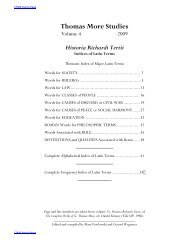life of john picus earl of mirandola - The Center for Thomas More ...
life of john picus earl of mirandola - The Center for Thomas More ...
life of john picus earl of mirandola - The Center for Thomas More ...
Create successful ePaper yourself
Turn your PDF publications into a flip-book with our unique Google optimized e-Paper software.
[87]<br />
Philosophers<br />
High estate<br />
Mean estate<br />
<strong>The</strong> right fruit <strong>of</strong><br />
study<br />
36 <strong>Thomas</strong> <strong>More</strong>’s Life <strong>of</strong> John Picus<br />
not study there<strong>for</strong>. This man rather exercised the study <strong>of</strong> merchandise<br />
than <strong>of</strong> wisdom. Ye write unto me that it is time <strong>for</strong> me now to put<br />
myself ⌐ in household with ¬ some <strong>of</strong> the great princes <strong>of</strong> Italy, but I<br />
see well that as yet ye have not known the opinion that philosophers<br />
have <strong>of</strong> themselves, which (as Horace saith 1 ) repute themselves kings<br />
<strong>of</strong> kings; ⌐ they love liberty; ¬ they cannot bear the proud manners <strong>of</strong><br />
estates; they cannot serve. 2 <strong>The</strong>y dwell with° themselves and be° content<br />
with the tranquillity <strong>of</strong> their own mind; they suffice themselves<br />
and more; they seek nothing out° <strong>of</strong> themselves; the things that are<br />
had in honour among the common people, among them be° not held<br />
honourable. All that ever the voluptuous desire <strong>of</strong> men thirsteth <strong>for</strong>,<br />
or ambition seeketh <strong>for</strong>, they set at naught and despise. Which while<br />
it belongeth to all men, yet undoubtedly it pertaineth most properly to<br />
them whom <strong>for</strong>tune hath so liberally favoured that they may live not<br />
only well and plenteously but also nobly. <strong>The</strong>se great <strong>for</strong>tunes lift up a<br />
man high and set him out to the show,° but <strong>of</strong>tentimes as a fierce and<br />
a skittish horse they cast <strong>of</strong>f their master. Certainly always they grieve<br />
and vex him and rather tear him than bear him. <strong>The</strong> golden mediocrity, 3<br />
⌐ the mean estate, ¬ is to be desired, which shall bear us as it were in<br />
hands 4 more easily, which shall obey us and not master us. I there<strong>for</strong>e,<br />
abiding firmly in this opinion, set more by my little house, my study,<br />
the pleasure <strong>of</strong> my books, ⌐ the rest and ¬ peace <strong>of</strong> my mind, than by<br />
all your kings’ palaces, all your common business, 5 ⌐ all your glory, ¬ all<br />
the advantage that ye hawk after, 6 and all the favour <strong>of</strong> the court. Nor<br />
I look not <strong>for</strong> this fruit <strong>of</strong> my study, that I may thereby hereafter be<br />
tossed in the flood and rumbling <strong>of</strong> your worldly business, 7 but that<br />
7 with within / be are / 9 out outside / 10 be are / 16 set . . . out to the show display ostentatiously,<br />
“exhibit . . . on the stage” (OED s.v. set 149i)<br />
1. Epistles 1.1.106–107. Horace humorously concludes this verse epistle: “To sum up: <strong>The</strong> wise<br />
man [sapiens] is less than Jove alone. He is rich, free [liber], honored, beautiful, nay a king <strong>of</strong> kings;<br />
above all, sound—save when troubled by the ‘flu’!” (H. Rushton Fairclough trans., Loeb ed., 1961).<br />
2. they cannot…serve: <strong>More</strong> expands the original Latin, mores pati & servire nesciunt, “they do not<br />
know how to patiently obey and serve” (CW 1:350, 351).<br />
3. golden mediocrity: <strong>More</strong>’s rendering <strong>of</strong> the Latin aurea…mediocritas (CW 1:350). This is sited in the<br />
OED as the <strong>earl</strong>iest usage in the sense <strong>of</strong> “golden mean” (s.v. mediocrity 1b). Cf. Horace, Odes 2.10.5.<br />
4. in hands: Presumably, <strong>More</strong>’s Latin read (or he misread) manus instead <strong>of</strong> the correct mannus<br />
(CW 1:235).<br />
5. common: <strong>The</strong> Latin has publicis, “public” (CW 1:350).<br />
6. the advantage…after: <strong>More</strong>’s rendering <strong>of</strong> the Latin vestris aucupiis, “that bird-catching <strong>of</strong> yours”<br />
(CW 1:350, 351).<br />
7. <strong>of</strong>…business: <strong>The</strong> Latin has rerum publicarum, “public affairs” (CW 1:350, 351).<br />
5<br />
10<br />
15<br />
20<br />
25











